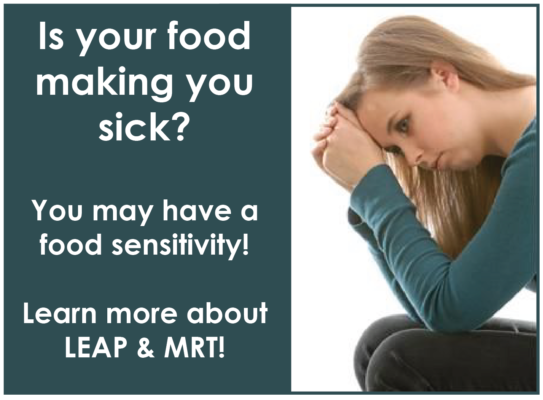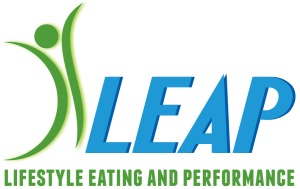Are you…
 Feeling tired, bloated, achy, or run down? Getting migraine headaches?
Feeling tired, bloated, achy, or run down? Getting migraine headaches?
Tired of taking expensive medications that don’t work and leave you with undesirable side effects?
Frustrated because you keep visiting your doctor but still can’t find a solution that takes your symptoms away?
You may be suffering from food sensitivities and not even know it. Many common health complaints and medical conditions are often caused by reactions to the foods and beverages, and chemicals in these items, that we consume regularly.
Following are just some conditions that are commonly associated with food sensitivities — inflammatory immune reactions in your body caused by foods and additives you eat:
- Irritable Bowel Syndrome (IBS)
- Migraines and other headaches
- Fibromyalgia
- Rheumatoid arthritis
- Crohn’s Disease
- Ulcerative Colitis
- Heartburn/Gastroesophageal Reflux Disease (GERD)
- Chronic Sinusitis
- Eczema/rash/hives
- Autism Spectrum Disorders
- ADD/ADHD
- Diabetes
- Weight fluctuations
- Other inflammatory conditions
(Note: Just because you have one of these conditions does not necessarily mean that you have food sensitivities.)
The diet remains one of the most neglected areas of medical treatment. Any food can cause symptoms, even healthy ones.
For those who want to feel better, relief can now be found through the LEAP (Lifestyle Eating and Performance) program, a simple and very effective food sensitivity testing and treatment program for food sensitivity related illness.
What test is used for LEAP food sensitivity testing?
The MRT (Mediator Release Test) is a simple blood test that tests for 170 common foods and chemicals and is the only blood test of its kind. It identifies delayed hypersensitivity reactions (food sensitivities) by measuring the changes in immune cells that occur when different foods and chemicals are introduced into your body. There are other blood tests that claim to identify food sensitivities; however, these tests have been shown to be far less accurate and far less helpful.
Symptoms from food sensitivities can be delayed up to three days (sometimes even longer) and the response is often dose-dependent (meaning a small amount may not cause symptoms, but larger amounts will). Because of this, it is very difficult, if not impossible, to determine which food(s) caused the reactions. In addition, some people may have sensitivities to a chemical found in certain foods, but not the food itself. For example, some people have a sensitivity to tyramine, which is found in beer, aged cheeses, orange pulp, packaged soups, soy sauce, eggplant, tomatoes, bananas, and other food items.
Other people may be sensitive to foods/chemicals that are also found in personal care products and household items. For example, coconut can be found in soap, shampoo, and toothpaste.
What happens after I get the test done?
After you complete the MRT food sensitivity testing, you will receive the following:
- MRT results and getting started guide
- Consultations to implement the various phases of your personal elimination diet
- Tracking of symptoms and problem-solving
- Menu planning, food preparation ideas, and recipes for meals and snacks, grocery shopping, and cooking
- E-mail and phone support for questions, troubleshooting, and tips
- Communication of progress to your physician (if desired)
See how LEAP has helped others
This video highlights how the LEAP program has helped others with their health complaints and medical conditions:
LEAP may be for you if:
- You are suffering from migraines
- You can’t seem to get to the bottom of your GI distress
- You suspect that certain foods are making your sick
- You want to know exactly what foods your body is sensitive to that’s causing inflammation
Are you a good candidate for LEAP? Schedule a  FREE consultation to find out!
FREE consultation to find out!
The consultation includes the following:
- Evaluation for appropriateness for LEAP
- Review of health history, eating habits, lifestyle considerations, and symptoms
(Blood draw locator for the MRT)
Contact me for more information.

